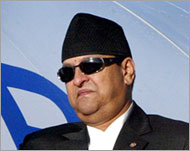Nepal parties welcome rebel ceasefire
Nepal’s political parties have welcomed a ceasefire called by Maoist rebels in the capital, Kathmandu, ahead of a planned general strike, saying the government now has no excuse to use force against protesters.

“It is a very positive development,” said Ram Sharan Mahat of the Nepali Congress, the largest party in the country.
“The Maoists, who believe in violence, are supporting our peaceful protests.”
An alliance of seven major political parties, angered by King Gyanendra’s seizure of power in the Himalayan kingdom early last year, has called for a general strike and a series of rallies from 6 to 9 April to press the king to restore democracy.
“We have been asking the rebels to cease violence, because only then can our movement be effective,” said Amrit Bohara, a senior leader of the Communist Party of Nepal.
“At a time when the government was getting ready for a confrontation, the rebels’ announcement has helped to ease the tension and ensure that there will be no violence,” Bohara said.
Anti-Terror Law
The government has threatened a crackdown on demonstrators, warning that “terrorists” were planning to infiltrate the protests and attack government targets. It said it would re-impose a state of emergency if things got out of control.
On Monday, rebel leader Pushpa Kamal Dahal, also known as Prachanda, said the guerrillas were suspending all attacks in Kathmandu until further notice, countering government claims that the rebels planned to increase their attacks during the strike.
 |
|
King Gyanendra seized power in |
The government has tightened an already tough anti-terror law allowing it to imprison anyone who has contact with the rebels, according to politicians and the Nepali media.
The amended Terrorists and Disruptive Activities Controlled and Punishment Ordinance “defines accomplices as those who remain in contact with the Maoists and help them,” the Kathmandu Post reported.
Political parties are concerned that they could be prosecuted under this law since they are involved in the campaign with the rebels against the king. They also fear that civilians who are coerced into aiding the guerrillas could be arrested.
Gyanendra last declared a state of emergency when he seized control in February 2005, cutting off communications, jailing politicians and imposing restrictions on the media. He said the move was necessary to quell the Maoist insurgency.
The rebels, who have intensified attacks since ending a unilateral ceasefire on 2 January, last targeted Katmandu on 14 January in raids that killed 12 policemen on the outskirts of the city.
The guerrillas began fighting in 1996 to replace the constitutional monarchy with a communist state and the insurgency has claimed about 13,000 lives.